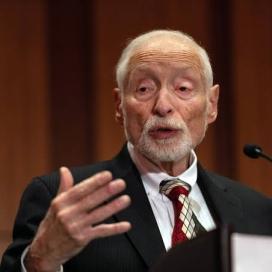Edgar
Cahn
Nominated by Julie Anne Reiskin:
"In 1964, the Cahns published an article in the Yale Law Journal, “The War on Poverty: A Civilian Perspective,” laying out a proposal for expansive legal services for the poor. Legal aid societies were not new, but the concept of a broader, formalized national program took hold as President Lyndon B. Johnson embarked on the War on Poverty.
This “seminal article in the 1964 Yale Law Journal revolutionized once-sleepy legal aid societies,” the New York Times editorial board wrote after Jean Camper Cahn’s death, “and foretold the development of vital, enterprising legal services offices.”
“I was deeply impressed” by their law review article, “almost overjoyed,” The Washington Post once quoted Shriver as saying. “That’s the genesis of legal services — it’s really pretty simple.”
In 1965, the OEO launched the Legal Services Program, a predecessor to the Legal Services Corp., a nonprofit organization established by law in 1974 that now funds 130 legal aid programs with more than 800 offices across the United States. Among advocates, the Cahns became known, along with Shriver, as the “parents of the federal legal services program.”
“Edgar was an idealist, a visionary, and a dreamer. He was also an entrepreneur, a builder, and a pragmatist. He was able to turn grand ideas into realities,” James J. Sandman, a former president of the Legal Services Corp., said in a statement, adding that Dr. Cahn’s life “was proof of the difference one person can make.”
Dr. Edgar Cahn is the author of No More Throw Away People: The Co-Production Imperative, Time Dollars (co-author Jonathan Rowe, Rodale Press, 1992), Our Brother’s Keeper: The Indian in White America (1972) and Hunger USA
Edgar was beloved in the client community because he saw that clients have value. He has been the lawyer that most valued those without a law degree. He founded timebanks promoting the concept that everyone has something to contribute and that people want to contribute. He provided training to client leaders and also personally supported an client award at NLADA conferences."
Nominated by Unknown:
"Edgar S. Cahn, a stalwart champion of social justice and co-founder of the Antioch School of Law, predecessor to the UDC David A. Clarke School of Law, left a unforgettable mark on the landscape of access to justice. Born in Manhattan on March 23, 1935, to parents deeply entrenched in advocacy, Edgar's early life hinted at his future path, characterized by a blend of mischief and virtue. His journey began with academic pursuits, culminating in degrees from Swarthmore College, Yale University, and Yale Law School. It was his tenure as Special Assistant to Attorney General Robert Kennedy that set the stage for his enduring commitment to systemic change. Through Kennedy's address at the University of Chicago in 1964, Cahn's progressive ideals found expression, advocating for shifts beyond traditional legal paradigms toward societal transformation.
The pivotal year of 1964 saw Cahn's collaboration with Robert Sargent Shriver, Jr., in establishing the National Legal Services program, a seminal moment in the evolution of legal aid in the United States. Their work laid the groundwork for the creation of the Legal Services Corporation, a testament to Cahn's capacity to effectuate large-scale change. By 1968, his focus extended to the rights of Indigenous communities, leading to the establishment of the Citizens Advocate Center and seminal works like ""Our Brother’s Keeper: The Indian in White America."" His tireless advocacy extended to combating hunger, with initiatives such as the Citizens’ Board of Inquiry into Hunger and Malnutrition in America.
In 1972, alongside his wife Jean Camper Cahn, Edgar founded the Antioch School of Law, embodying their shared vision of public interest legal education. Despite financial adversity, their perseverance led to the school's reincarnation as the District of Columbia School of Law, later becoming the David A. Clarke School of Law. Their commitment to clinical education set a precedent for legal training nationwide, catalyzing real-world impact through student engagement with marginalized communities.
The hallmark of Cahn's legacy lies in his pioneering concept of timebanking, a radical reimagining of currency based on reciprocal service. This innovative approach sought to empower marginalized communities by recognizing the inherent value of their time and contributions. Alongside his wife Christine Gray, Cahn propagated timebanking initiatives globally, advocating for its integration into socio-economic systems. His unwavering belief in the inherent dignity of every individual fueled his efforts to reshape legal frameworks, epitomized in his teaching and research at UDC Law.
Cahn's influence extended beyond academia, as evidenced by his instrumental role in establishing the Time Dollar Youth Court, a pioneering juvenile diversion program. His commitment to amplifying marginalized voices and dismantling systemic injustices remained unwavering, earning him numerous accolades throughout his lifetime. From the Charles J. Ogletree, Jr. Champions of Justice Award to the William Pincus Clinical Award, Cahn's impact reverberated across legal and humanitarian spheres.
In his own words, Cahn encapsulated his ethos: "You can get anything done as long as you don't care who gets the credit." His humility belied the profound legacy he forged, forever altering the trajectory of access to justice. As we reflect on his contributions, Edgar S. Cahn's vision serves as a guiding light, inspiring generations to pursue social justice with unwavering resolve and boundless compassion.""

